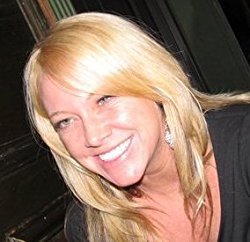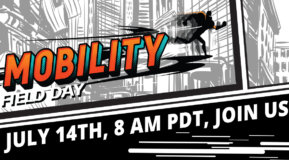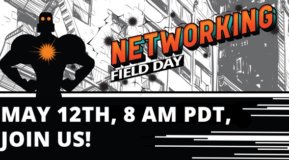Jennifer is a self-professed security diva. As a prominent woman in cybersecurity, Jennifer is a sought-after speaker, advisor and thought leader. She is vice president of engineering and security at Carolina Advanced Digital, a consulting firm in North Carolina. Follow @jjx on twitter.
 Jamie Easley: When you are not at events like at Mobility Field Day, what’s your day job?
Jamie Easley: When you are not at events like at Mobility Field Day, what’s your day job?
Jennifer Minella: My background is a network architect and engineer, and I specialize in integration at Carolina Advanced Digital. I’ve been doing wired and wireless infrastructure my whole adult life.
I started with security, and got my CSSP certification in the mid-2000s. My role on the engineering side is to use infrastructure to solve customer problems. As a consultant, I bridge the gap between the technical and business teams or between the security and network teams.
Jamie: How did you get into networking?
Jennifer: I was born into it. Carolina Advanced Digital is a family-owned company. My father started the company out of the basement of our house, and my mom joined later. My parents have managed the company for 38 years.
I always liked science and math, but I’m equally left brain/right brain. I do competitive ballroom dancing and paint. I’ve done everything from graphic design to web development, but I needed to know how everything worked, so I went deeper into network and security engineering.
Jamie: What is the biggest impact Wi-Fi has had on your life?
Jennifer: Professionally, Wi-Fi is my career. I spend a big part of my time speaking and engaging around wireless.
On the personal side, it’s a tricky question. I’m not a gadget person, but I like to sit outside by the pool with my Kindle. Wi-Fi has impacted how we live our lives and how we navigate the world logically and physically at all layers of society.
Jamie: There’s a widespread shortage of tech workers. What do you think we can do to encourage more young people to focus on STEM?
Jennifer: I get into debates about what the shortage really is. I serve as the chairperson of the board for (ICS)2, the security nonprofit, so I see all facets of the discussion.
The first step is to recognize that the industry has a problem. The hacker with the hoodie is the mascot of InfoSec. The security world isn’t really like that, but that’s the flag we fly. We need to draw a more diverse set of people.
There are a lot of good programs that focus on STEM. I volunteer with the Air Force Association’s CyberPatriot youth cyber-education program. It teaches kids networking, sys admin and security skills. It’s hands-on and competitive, which tends to get kids interested. It’s like a gateway drug. You get your hands on it and realize the power and creativity behind coding.
It’s never too early or too late to focus on tech. One of the very talented girls in the CyberPatriot program is going to college for veterinary studies in the fall. Even if she is going to vet school now, there’s nothing to stop her from maintaining her tech skills or revisiting them later in her career.
Jamie: What advice would you offer to someone who is just starting out in networking and security?
Jennifer: Ask questions, especially in security but also in all tech. When you’re coming in new, there’s a certain level of knowledge that you’re expected to have. People will sit there and listen, but they often don’t completely understand an acronym or a concept, and they don’t feel it’s appropriate to stop and ask. When it comes to tech, there are so many pieces, we can’t know everything. We need a village. And we need an environment where it’s safe to ask questions.
Jamie: Why did you become a delegate for Mobility Field Day?
Jennifer: This is my first time at Mobility Field Day, so I don’t know what I don’t know. It will be a good learning opportunity. I know the content is good.
Jamie: There’s a lot of talk in the industry that 5G will replace Wi-Fi. What’s your opinion?
Jennifer: As the English say, a fisticuffs is coming up. On the 5G side, anytime we have something new and disruptive there are a lot of unknowns. There may be some unforeseen barrier to adoption, an unpredicted use case or another use case that never happens. Until we see 5G in action, there are a lot of question marks.
In this industry, we diverge and converge. We see it with compute power, which went from centralized to distributed and back to centralized. For a while, 802.11 was mimicking cellular, and now cellular is looking like 802.11. It will be interesting to see whether 5G is truly different enough and whether it will be complementary or codependent to 802.11.
Jamie: There’s a lot of talk in the industry that AI and robots are going to take our jobs. How do you think AI will impact the life of a network engineer or admin?
Jennifer: If we’re talking about real AI – not what the marketing people call AI – robots are not going to take our job. We can automate some tasks that are redundant and predictable. But things that humans do to personalize the experience and be creative will not be automated. AI will be additive.
Jamie: Dave Benham, another #MFD4 delegate, had a question for you. Actually, he had two: First, what industry trend are you most excited about in the next year? Second, what part of the potential of Wi-Fi operating in 6GHz excites you the most?
Jennifer: The most exciting industry trend are some interesting security startups that straddle different buckets of technology, blending traditional forensics and endpoint security.
The thing that excites me most about 6GHz Wi-Fi is that we have it (kinda tongue in cheek) but the FCC is pretty stingy with spectrum, so the fact that they’re demonstrating some level of adaptation and agility (or at least, flexibility) in issuing it is probably the most single impactful part of it (followed by the various uses).
Jamie: I’m speaking with Francois Verges tomorrow. Do you have a question for him?
Jennifer: I would be interested in knowing how he applies the information he learns at Mobility Field Day.
Meet the #MFD4 Delegates
Tim Dennehy is ready to ask vendors the hard questions.
Haydn Andrews walked 20 kilometers to do a single site survey.




